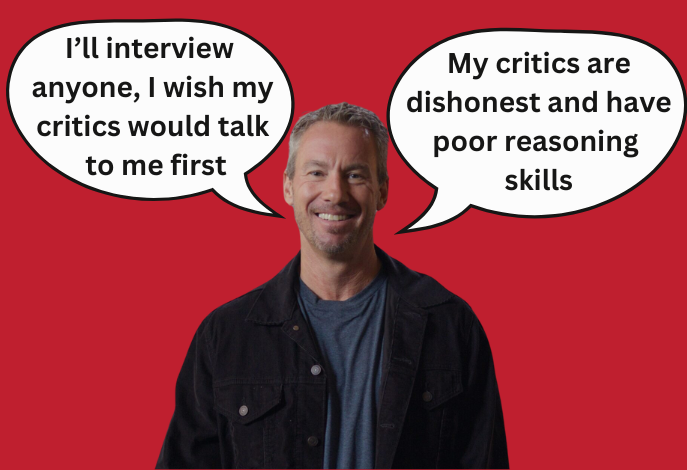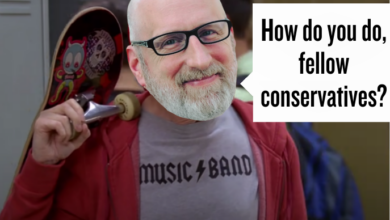Who is The Real Preston Sprinkle? Part 2: Rules for Thee, but not for Me

This article is part of a series, click here for part 1 or here for part 3
For the related podcast episode, click here
In the last article, we saw that it may be prudent not to take Preston’s claims at face value. For part 2, we should expand upon that and establish a framework for how Preston communicates. This is very important for where the rest of this series will head, as this framework will allow us to more effectively review Preston’s teachings. We will look at Preston’s stated goals, personal rules, and philosophy for interviews; and then we will compare those to his words and actions. Does the real Preston align with the theoretical Preston?
What is Preston’s Philosophy for His Podcast?
Previously I mentioned talking with Greg Coles from Preston’s “Center for Faith, Spirituality & Gender” (the Center). In the conversation, I asked about Preston’s philosophy for guests, and I was directed to an episode of Preston’s podcast where he spoke about that, among other things. In the episode, he presented his mission statement: “The Theology in the Raw podcast aims to help believers think Christianly about theological and cultural issues by engaging in curious conversations with a diverse range of thoughtful people.” Fair enough, but what does that mean? What does Preston mean when he says “think Christianly,” “diverse range,” or “thoughtful people”? We’ll see more from Preston on that later, but for now, it’s enough to say the definitions matter.
Preston would clarify that he has no “fear of platforming” as it “doesn’t apply to the nature of what this particular podcast is” because the podcast is not a sermon or teaching on what truth is, rather, it is about conversations. Though he said this specifically about the podcast, both this and his mission statement seem to function for all of his ministry endeavors. It’s worth noting that the two statements here are not immediately compatible. Is Theology in the Raw (TitR) trying to “help believers think Christianly” (educating) or is the podcast not teaching and is just conversations?
Overall this is a minor contradiction, but it does show a lack of clarity in defining his objectives. Preston tends to do that, obfuscating what should otherwise be a simple and quick point, but that is something we will touch on in future installments of this series.
The Perils of Platforming
Preston having no fear of platforming is not true, even outside of ridiculous examples like not bringing on the leader of the KKK. Why do I say this? Preston himself has clarified as much in comments made in his podcast with Jared Moore, where he made it clear several times that Jared Moore is someone he is not okay with platforming, and bringing him on was an exception that Preston seemingly regrets. This also contradicts the idea that the podcast is not teaching, as if it were simply conversations, then truly having no restrictions would make sense. This arrives at the heart of the matter: nothing is neutral. There is no such thing as a conversation that isn’t teaching (promoting an idea) since if that were true the conversation would be pointless. You could say that small talk is an expectation to that rule, but even if you want to make that exception, it is not relevant to the type of “conversations” we’re talking about. Preston seems to understand this, as a pointless conversation would run afoul of TitR’s mission “to help [instruct, teach] believers think Christianly about theological and cultural issues.”
This does not mean that there is no time or place for exploratory conversations or interviews with people of opposing ideas. Framing is important, though, and setting up—implicitly or explicitly—a false idea of neutrality is irresponsible. People need clear parameters to understand the conversation’s context, and it is the host’s job to be the audience’s guide. This is why I would not hesitate to bring Preston on the podcast, and I have extended that offer to him multiple times. Preston understands the need to provide context for conversations with guests he disagrees with, but that will be fleshed out in the next section.
To justify what I would at best call a reckless philosophy, Preston throws responsibility on the audience, saying, “You have to be an active listener. You have to question both what I say, and what my guests say.” I have to say, this irritates me. Not because he’s encouraging people to test things, as that’s something we should do in all circumstances. Rather, it’s used to absolve himself of any responsibility to his audience and as a justification for not helping those people. A host is not there to have the conversation he wants to have, but to have the conversation that makes sense of the topic for his audience. He asks guests questions that clarify the topic for his audience. The host is responsible for what he puts out, and if it was communicated well. Far too often in modern society, regardless of ideology, we jump to accusing others for “misinterpreting/misrepresenting” us, rather than taking responsibility for our own communication. Even if it is ultimately up to the listener to decide what they do with the information they receive, the host is still responsible for ensuring his communication is clear and his message can be understood by a reasonable person.
More than not helping his listeners, he muddies the water by saying he’ll represent objections—ones he doesn’t agree with—to his guest’s positions. Why do I say that playing devil’s advocate is a bad thing, especially as that is something I do on the podcast? Because in listening to many of Preston’s podcasts, I cannot tell if/when he’s representing an objection he holds to, or when he’s playing devil’s advocate. Again, he does not act as a guide who clarifies things but instead adds more confusion. In the end, what he lays out for his podcasting philosophy is chaotic and arbitrary, and places the burden on the audience to figure out what Preston actually believes.
Breaking His Rules
Let us return to Preston’s podcast with Jared Moore, something we’ve previously commented on. In that episode, Preston gave us many points that will help clarify the questions we have, and clarify what he’s already said. As previously stated, Preston said many times in the podcast that Jared is someone he is not okay with platforming, and that having him on was an exception to a rule he has about engaging with critics.
This seems like a blatant contradiction of the “no fear of platforming” statement, which leaves us with another apparent contradiction from Preston. What are the reasons Preston gives for this breach of his rule on “no fear of platforming”? He says, among other things, that Jared is disingenuous, unthoughtful, dehumanizing, a liar, possessing deficient reasoning skills, and from a categorically different brand of Christianity.
Why is any of that an issue, though? Isn’t the podcast conversation and not teaching? It would seem that the confusing and conflicting philosophies are dumped out the window when reality comes knocking. Preston does have limits on who he will platform. Preston does see the need to provide context for conversations with a person he disagrees with. Preston does see his podcast as more than neutral conversation.
In the clips below, you will see Preston mention, over and over, “debate,” and how he doesn’t like to, or want to, debate differences. This is interesting, as it helps to clarify that he isn’t as keen to point out differences, or even interview someone with differences, as he earlier indicated.
Who then is the type of person that Preston will not platform? Well, it is someone he sees as having a fundamentally different brand, or as Preston said, “categorically different brand,” of Christianity. That is a very telling phrase, “categorically different.” To have a “categorically different” view on a topic is to have an incompatible, different in essence, crucially different view. When applied to Christianity, that would mean a salvific difference, as that is the only difference that is fundamental, essential, or crucial. Do not agree with that explanation? Add the context that Preston thinks Jared’s “brand” is not “close to the heart and truth of Jesus.”
What does this mean? Well, it means that those who he will platform have a compatible brand of Christianity (different in non-fundamental ways). So Jared Moore, who holds a view of sexuality that Preston claims to fundamentally agree with, represents a different Christianity (a different gospel). Elizabeth Black of Kaleidoscope, who holds to views of sexuality that would fundamentally disagree with beliefs Preston claims to hold, thus would represent a brand of Christianity that is compatible with Preston.
Do you see the issue here? Not only is Preston, functionally, making a gospel distinction and drawing lines due to that, but he is placing people with unorthodox views in his brand of Christianity. Further, his words have lost most reliability, and the need to investigate what he says has become much greater. This is why the foundation we’re building through part 2 is so essential.
Rules for Thee, but not for Me
Finally, we reach the title of the article. There were already hints of this, but this is where the rubber meets the road. Several points became clear when he applied his philosophies with Jared. First, as the episode went on, Preston repeatedly defended himself, rather than by answering questions, by appealing to some piece of content he’s created. This was done to “expose” Jared for not having read/listening to the massive amount of content Preston has. The thing is, Preston admitted to only doing a few minutes of scrolling Jared’s Twitter feed in order to come to a conclusion about him.
Though Preston makes a great deal of “thoughtfulness” and “humanizing,” he was domineering in the conversation, and constantly interrupted Jared. It seems he holds his guests to a different standard.
Preston bemoaned people not contacting him directly, yet he has not responded to the multiple emails (among other attempts to contact him, even offering to visit Boise and have an off-the-record conversation) that I have sent him. Beyond that, he admitted to having a rule of not engaging critics. That seems a bit of a different standard for his critics than he holds for himself.
Finally, Preston said he wasn’t the one calling someone a heretic. Except he did, and not even by implication. He claimed Jared, and by extension others, had a categorically different brand of Christianity, as we previously looked at. Now, some might defend Preston by saying, “That’s not what he meant.” My response: “But that’s what he said.” I can only go off what he said, and that is the meaning of what he said. If that’s not what he meant, then the burden of correction and retraction lies with him.
To conclude, I want us to look at the following comment for the YouTube release of the Jared Moore podcast. This comment is the top comment on the video.

Though I think this comment is a bit too gracious to Preston, it does show that even his own audience could see the inconsistency on display.
We need to keep in mind the lessons learned in this part of the series, as they will be important as we dive into his more direct teachings.
Question for Preston
What is the fundamental difference between your brand of Christianity, and Jared’s, and how do you reconcile the use of “fundamental”?
Bonus: Can you explain the contradictions between your stated mission statement and clarifications of what the podcast is, but also between your stated positions and your actions concerning Jared?




